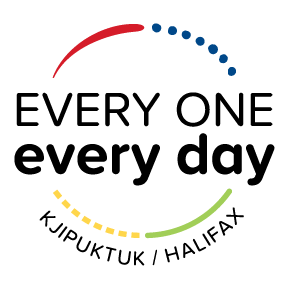FAQs
-
Every One Every Day is working with local residents and organizations to create opportunities for neighbors to connect and learn over shared interests, and where everybody from across the local area can get to know each other.
To do this, we are building a “platform approach” to inclusive participation that is reconciliation focused and inclusive to all.
The Every One Every Day platform enables people from different parts of the North End neighbourhood to create and learn from one another by starting and growing collections of neighbourhood projects. These projects involve sharing spaces, skills and resources. They range from batch cooking and community meals, getting outside to explore the neighbourhood, sharing cultural knowledge and traditions, as well as making, crafting, building, repairing and much more.
Every One Every Day aims to inspire a way of life in neighbourhoods and communities where things we value, like culture, or connection to nature, are reflected in the places that we live and the things we do together. And above all, that there are inviting spaces for many different neighbours to easily connect, learn, and bring ideas to life in the neighbourhood.
-
There is no cost to participate and you do not need to sign up. To start, all of the EOED sessions will be drop-in, with numbers limited by public health guidelines. Be sure to stay tuned for updates! It is important to keep an eye out for any changes or cancellations that may result from shifting public health protocols and/or weather. We’ll update the website regularly and send any session changes via our facebook page when we can.
-
Everyone is welcome to join in. In order to generate the scale of participation needed to achieve positive change at the neighbourhood level, participation needs to be convenient, barrier-free, open and inviting, and valuable to one’s daily life. This means it needs to be close to where one lives and works every day. So, while Every One Every Day invites all to join in, the true vision is that people don’t have to travel to participate.
-
Only registered service animals are allowed. No pets are allowed at The Neighbourhood Shop, Community Build Trailer, or Mi’kmaw Native Friendship Centre.
-
Co-design with Residents
Open Invitation to take part: All participation models would describe themselves as ‘open’ as a general principle. In practice we know there are a lot of barriers and that we need to pay attention to the smallest details of visible and invisible barriers.
Examples:
Peer-to-peer: The action is between peers working together. Learning new skills is done through informal peer-to-peer interactions, rather than formal institutional ones. Residents are engaged as “Co-producers” from the start, where ideas can be surfaced and brought to life quickly in the neighbourhood.
Multiple entry points and self-directed pathways of participation: People can pop into the space to say hello or have a cup of tea, and build up their participation from these small steps, right through to employment or self-employment. People can choose exactly how much participation they want, what kind of participation they want, at times and locations that suit them.
Productive activity: Participatory culture projects are often based on simple common denominator productive activities such as cooking, making and learning. The dynamic is about what people can produce together.
Making is easy to take part: Bringing the activity closer to where people live – near apartment complexes or a 5 - 15-minute walk away. Friends and neighbours will be encouraged to introduce people to the network of activity, and even initially accompany them if necessary.
-
Within a 5-to-15-minute walk from your home there are opportunities - maybe 20 or more every day to participate in free activities with neighbours. These might be in spaces on a main street in your neighbourhood (like the Every One Every Day Neighbourhood Shop), or in kitchens, workshops, libraries or recreation centers nearby.
These activities would be free, low commitment, and open to everyone. You could decide to join at short notice by dropping in on your way home and you could join in alone, or with friends or family members. Children would be welcome in all spaces and would be supported to take part in making and doing things alongside you.
These activities would be imaginative and creative project ideas, some of which would also help you with your day-to-day life - like saving money through bulk cooking or bulk buying, skills sharing, mending and repairing clothing, or making things that you need every day such as equipment, food, clothing or furniture. By doing these things everyday with people nearby, you’d start to build new networks of support, so that everyday life is that much easier, and more enjoyable.
You would be invited to meet many different people and build new friendships across different parts of your neighbourhood. These spaces would allow you to develop your ideas without any formal qualifications and you’d be able to work shoulder to shoulder with others who are exploring the same things you are. Through these activities you would be able to get to know many more people in informal and enjoyable settings.
-
A collection of many support elements shared across all the projects: Project Design Team, Functional Spaces, project ideas, organizing, insurance, promotions, and metrics.
The purpose of this support platform is to make it easier to start, grow and maintain collections of projects, which in turn makes it easier for many people to participate regularly.
Over time, the support platform builds and sustains participation systems, together with local people.
